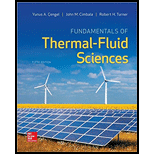
Concept explainers
(a)
The volume flow rate, density of carbon dioxide at the inlet, and the volume flow rate at the exit of the pipe using the ideal gas equation of state.
(a)
Explanation of Solution
Given:
The inlet temperature
The inlet pressure
The mass flow rate of carbon dioxide
The outlet temperature
The outlet pressure
Calculation:
Refer to Table A-1, obtain the gas constant
Write the equation of volume flow rate at the inlet of the pipe.
Thus, the volume flow rate at the inlet of the pipe using the ideal gas equation is
Calculate the density at the inlet of pipe.
Thus, The density of carbon dioxide at the inlet using the ideal gas equation is
Calculate the equation of volume flow rate at the outlet of the pipe.
Thus, The volume flow rate at the exit of the pipe using the ideal gas equation of state is,, and
(b)
The volume flow rate, density of carbon dioxide at the inlet, and the volume flow rate at the exit of the pipe using the generalized compressibility chart.
(b)
Explanation of Solution
Calculate the equation of reduced pressure at the inlet of the pipe.
Calculate the equation of reduced temperature at the inlet of the pipe.
Calculate the equation of reduced pressure at the outlet of the pipe.
Calculate the equation of reduced temperature at the outlet of the pipe.
Refer to Figure 3-48, obtain the compressibility factor at inlet state
Refer to Figure 3-48, obtain the compressibility factor at outlet state
Write the equation of volume flow rate at the inlet of the pipe.
Calculate the density at the inlet of pipe.
Calculate the equation of volume flow rate at the outlet of the pipe.
Thus, the volume flow rate, density of carbon dioxide at the inlet, and the volume flow rate at the exit of the pipe using the generalized compressibility chart are
(c)
The error involved in the first case.
(c)
Answer to Problem 91P
The error involved in the first case are
Explanation of Solution
Calculate the percentage of error involved in the first case of volume flow rate at the inlet condition.
Here, calculated volume flow rate at inlet state from EOS is
Substitute
Calculate the percentage of error involved in the first case of density at the inlet condition.
Here, calculated density at inlet state from EOS is
Substitute
Calculate the percentage of error involved in the first case of volume flow rate at the outlet condition.
Here, calculated volume flow rate at outlet state from EOS is
Substitute
Thus, the error involved in the first case are
Want to see more full solutions like this?
Chapter 4 Solutions
Fundamentals of Thermal-Fluid Sciences
- PROBLEM 3.46 The solid cylindrical rod BC of length L = 600 mm is attached to the rigid lever AB of length a = 380 mm and to the support at C. When a 500 N force P is applied at A, design specifications require that the displacement of A not exceed 25 mm when a 500 N force P is applied at A For the material indicated determine the required diameter of the rod. Aluminium: Tall = 65 MPa, G = 27 GPa. Aarrow_forwardFind the equivalent mass of the rocker arm assembly with respect to the x coordinate. k₁ mi m2 k₁arrow_forward2. Figure below shows a U-tube manometer open at both ends and containing a column of liquid mercury of length l and specific weight y. Considering a small displacement x of the manometer meniscus from its equilibrium position (or datum), determine the equivalent spring constant associated with the restoring force. Datum Area, Aarrow_forward
- 1. The consequences of a head-on collision of two automobiles can be studied by considering the impact of the automobile on a barrier, as shown in figure below. Construct a mathematical model (i.e., draw the diagram) by considering the masses of the automobile body, engine, transmission, and suspension and the elasticity of the bumpers, radiator, sheet metal body, driveline, and engine mounts.arrow_forward3.) 15.40 – Collar B moves up at constant velocity vB = 1.5 m/s. Rod AB has length = 1.2 m. The incline is at angle = 25°. Compute an expression for the angular velocity of rod AB, ė and the velocity of end A of the rod (✓✓) as a function of v₂,1,0,0. Then compute numerical answers for ȧ & y_ with 0 = 50°.arrow_forward2.) 15.12 The assembly shown consists of the straight rod ABC which passes through and is welded to the grectangular plate DEFH. The assembly rotates about the axis AC with a constant angular velocity of 9 rad/s. Knowing that the motion when viewed from C is counterclockwise, determine the velocity and acceleration of corner F.arrow_forward
 Elements Of ElectromagneticsMechanical EngineeringISBN:9780190698614Author:Sadiku, Matthew N. O.Publisher:Oxford University Press
Elements Of ElectromagneticsMechanical EngineeringISBN:9780190698614Author:Sadiku, Matthew N. O.Publisher:Oxford University Press Mechanics of Materials (10th Edition)Mechanical EngineeringISBN:9780134319650Author:Russell C. HibbelerPublisher:PEARSON
Mechanics of Materials (10th Edition)Mechanical EngineeringISBN:9780134319650Author:Russell C. HibbelerPublisher:PEARSON Thermodynamics: An Engineering ApproachMechanical EngineeringISBN:9781259822674Author:Yunus A. Cengel Dr., Michael A. BolesPublisher:McGraw-Hill Education
Thermodynamics: An Engineering ApproachMechanical EngineeringISBN:9781259822674Author:Yunus A. Cengel Dr., Michael A. BolesPublisher:McGraw-Hill Education Control Systems EngineeringMechanical EngineeringISBN:9781118170519Author:Norman S. NisePublisher:WILEY
Control Systems EngineeringMechanical EngineeringISBN:9781118170519Author:Norman S. NisePublisher:WILEY Mechanics of Materials (MindTap Course List)Mechanical EngineeringISBN:9781337093347Author:Barry J. Goodno, James M. GerePublisher:Cengage Learning
Mechanics of Materials (MindTap Course List)Mechanical EngineeringISBN:9781337093347Author:Barry J. Goodno, James M. GerePublisher:Cengage Learning Engineering Mechanics: StaticsMechanical EngineeringISBN:9781118807330Author:James L. Meriam, L. G. Kraige, J. N. BoltonPublisher:WILEY
Engineering Mechanics: StaticsMechanical EngineeringISBN:9781118807330Author:James L. Meriam, L. G. Kraige, J. N. BoltonPublisher:WILEY





